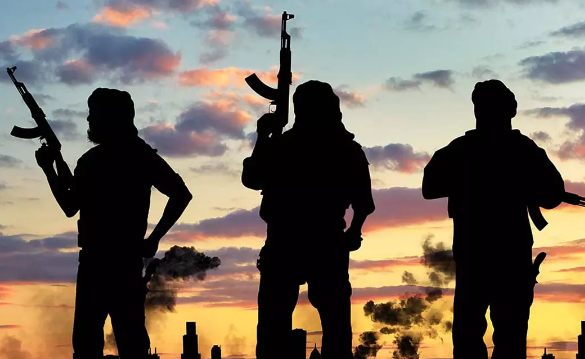Foreign
Ghana counts ballots after stiff presidential election

Ghana counted ballots on Saturday after a tight election with the ruling party’s Vice President Mahamudu Bawumia trying to shake off anger over economic woes and rebuff a challenge by opposition party candidate ex-president John Mahama.
Ghana’s struggling economy dominated the election, after the west Africa gold and cacao producer went through a debt default, high inflation and negotiations for a $3 billion IMF bailout.
Voters were choosing a successor to Bawumia’s boss, President Nana Akufo-Addo, who steps down after serving the maximum of two four-year terms. They will also elect the country’s new parliament.
Voting was mostly calm, but one person was shot dead and four people arrested at a polling station in Nyankpala in the country’s northern region, police and local media said.
After polls closed at 1700 GMT, election teams immediately began tallying ballots under the watch of agents from political parties before sending them to collation centres.
Preliminary results are expected early Sunday, with full presidential results scheduled by Tuesday.
“Everyone is complaining prices are high. So I want a change, I want a good president who will bring in changes,” Abdullah Mohammed, a student said after voting in Accra’s Nima district.
With a history of political stability, Ghana’s two main parties, the ruling New Patriotic Party (NPP) and National Democratic Congress (NDC), have alternated in power equally since the return to multi-party democracy in 1992.
Touting the slogan “Break the 8” — a reference to going past the usual two terms in power — the NPP hopes Bawumia can lead them to an unprecedented third term. But he struggled to break away from criticism of Akufo-Addo’s economic record.
“I think we have done a lot of work with our message to the people and the message has been well received,” Bawumia said after voting in his northern home Walewale.
A UK-educated economist and former central banker, he points to an economy turning a corner and the government’s continued plans for digitalisation to ease business, as well as free education and health programmes.
Economic frustrations
But though inflation slowed from more than 50 percent to around 23 percent, and other macro-economic indicators are stabilising, the economic pain was still a clear election issue.
Many Ghanaians still say they struggle with the cost of living, scarce jobs and a depreciated cedi currency.
Frustration over the economy has opened the way for a comeback challenge from Mahama, who was president from 2012 to 2017 but has since failed twice in presidential bids.
The NDC flag-bearer says he will “reset” Ghana and introduce a “24-hour economy”, extending industrial hours to create jobs, and also renegotiate parts of the IMF deal.
“Other elections have not been as obvious,” Mahama said voting in his northern hometown. “With this one, everybody can tell the direction because of the abysmal performance of the Akufo-Addo-Bawumia government.”
Some analysts gave him an edge because of voter dismay with NPP, but the former president faced criticism from those who remember financial woes and massive power cuts during his time in office.
Shoe saleswoman Esther Adobea said the economic situation hurt, but she was willing to give Bawumia a chance to make things better.
“I can see he can handle the country for us. Our economy is not good, but he can do better,” she said.
Both major candidates are from the north of the country — traditionally an NDC stronghold, but now more fragmented — making the region a key battleground.
While the economy was key, Ghana also faces an increasing risk of spillover in its northern regions from jihadist conflicts in Niger and Burkina Faso, where military juntas rule.
The spread of illegal gold mining also became an election issue. Akufo-Addo promised to stop illegal mining, but it has expanded, poisoning riverways and impacting cacao farmlands — a major source of export income.
AFP
Foreign
Ukraine Accuses Russia Of Launching 2800 Aerial Bombs, Over 1400 Drones In 14 Days

Ukrainian President, Volodymyr Zelensky, has accused Russia of ongoing hostilities, stating that since the beginning of April, Russia has launched nearly 2,800 aerial bombs, over 1,400 Shahed drones, and approximately 60 missiles at Ukraine.
Zelensky’s statement, released on Monday, reads, “Currently, 38 people are receiving treatment inmedical facilities in Sumy following yesterday’s Russian ballistic strike — among them, 9 children. Eleven people, including 3 children, are in critical condition.”
“Every effort is being made to provide them with maximum assistance. Yesterday’s strike alone claimed 34 lives and left 119 people injured. Tragically, 2 children were killed, and another 15 were wounded.”
“Another 7 people were injured overnight in Odesa during a ‘Shahed’ drone attack. Last night, the Russians also struck Slovyansk, Uman, Kharkiv, Beryslav, and other cities and villages.”
“All the damaged sites are civilian: apartment buildings, stores, a car service station.”
“I thank all the services and everyone involved in rescuing people and defending lives. Russian terror continues every day and night. Since the beginning of April alone, the Russian army has used nearly 2800 aerial bombs, over 1400 attack drones — most of them ‘Shaheds’ — and nearly 60 missiles of various types, including ballistic ones.”
“Only real pressure on Russia can stop this. Tangible sanctions are needed against the sectors that finance Russia’s killing machine. The one who brought the war must be stopped and held accountable for what they have done; that is only fair,” Zelensky said.
In an earlier statement yesterday, Zelensky urged the world not to remain silent in the face of Russia’s continued aggression against Ukraine: “As of now, 31 people are known to have been killed in Sumy by the Russian ballistic missile strike. Among those killed were two children. My condolences to the families and loved ones… More than 84 people have been wounded, including 10 children. All of them are receiving the necessary assistance.”
“It is crucial that the world does not stay silent or indifferent. Russian strikes deserve nothing but condemnation. There must be pressure on Russia to end the war and guarantee security for people. Without truly strong pressure, without sufficient support for Ukraine, Russia will continue dragging this war out.”
Zelensky also accused Russia of rejecting a potential peace opportunity involving U.S. President Donald Trump.
“It’s now the second month that Putin has been ignoring the U.S. proposal for a full and unconditional ceasefire. Unfortunately, there in Moscow they are convinced they can keep killing with impunity. Action is needed to change this situation.”
World leaders have condemned the latest wave of Russian attacks and pledged solidarity with Ukraine.
On Saturday, top diplomats from Russia and Ukraine traded accusations over breaches of a tentative ceasefire agreement brokered by the United States. The deal aimed to halt attacks on critical energy infrastructure, signaling an attempt to ease tensions in the third year of the war.
However, Sunday’s strike underscored the fragility of such negotiations and the continued toll on Ukrainian civilians.
The war, which began with Russia’s full-scale invasion in February 2022, has resulted in tens of thousands of deaths and millions displaced, with no comprehensive peace agreement in sight.
International observers have raised concerns that the missile strike may constitute a violation of international humanitarian law.
Sumy, located near Ukraine’s northeastern border with Russia, has faced repeated assaults since the war began but had seen a relative lull in recent months. Sunday’s bombing marks one of the deadliest strikes in the region in over a year.
Ukrainian officials have called on allies to increase military aid and intensify sanctions on Russia, warning that continued attacks on civilian areas threaten any hope for a negotiated resolution to the war.
Foreign
US orders 30-day registration for all foreign nationals or face jail, deportation

By Francesca Hangeior
The United States Department of Homeland Security (DHS) has announced a new rule requiring all foreign nationals who stay in the country for more than 30 days to register with the federal government.
The directive, introduced this week, is one of the strictest immigration measures in recent years.
In a post titled “Message to Illegal Aliens” and tagged to President Donald Trump and Homeland Security Secretary Kristi Noem, the agency stated,
“Foreign nationals present in the U.S. longer than 30 days must register with the federal government. Failure to comply is a crime punishable by fines and imprisonment. @POTUS Trump and @Sec_Noem have a clear message to Illegal aliens: LEAVE NOW and self-deport.”
Foreign nationals present in the U.S. longer than 30 days must register with the federal government. Failure to comply is a crime punishable by fines and imprisonment. @POTUS Trump and @Sec_Noem have a clear message to Illegal aliens: LEAVE NOW and self-deport. pic.twitter.com/FrsAQtUA7H
Non-compliance could lead to daily fines of $998, heavier penalties for those who promise to leave but don’t, imprisonment, and permanent bans from re-entry.
DHS warned that delaying registration will increase penalties and reduce the chances of returning legally.
“The longer you wait, the higher the penalty, and the slimmer your chances of returning,” the department said.
The agency also introduced a “safe exit” provision for undocumented individuals who choose to leave voluntarily.
Those who self-deport may be allowed to select their departure flight, keep their earnings if they haven’t committed any crimes, apply for subsidized travel if they can’t afford it, and stay eligible for future immigration pathways.
While the rule doesn’t currently apply to individuals on valid visas like H-1B or F-1, DHS emphasized that once a visa becomes invalid—due to expiration, job loss, or program termination—the individual is considered “unlawfully present” and subject to the same penalties.
Maintaining legal status, the agency noted, is more critical than ever.
Foreign
Swiss woman abducted in Niger Republic

By Francesca Hangeior
A Swiss citizen has been kidnapped in Niger, Switzerland’s foreign ministry told AFP, confirming information published by a Nigerien media outlet.
The foreign ministry said it had been “informed of the kidnapping of a Swiss citizen in Niger.
“The Swiss diplomatic mission in Niamey is in contact with the local authorities. Clarifications are under way.”
The governor of the Nigerien state of Agadez, General Ibra Boulama Issa, said the abduction happened in Agadez city, where an Austrian woman was kidnapped three months ago.
The general said “a foreign woman… of Swiss nationality” had been taken from her home there late Sunday.
In a statement, he also referenced the January 11 kidnapping of the Austrian.
-

 News24 hours ago
News24 hours agoJust in: Namibia Moves to Deport Over 500 Americans in Bold Visa Policy Shift
-

 News19 hours ago
News19 hours agoYou must refund N300m, Rivers State tells NBA
-

 News6 hours ago
News6 hours agoPeter Obi speaks as Benue govt. blocks humanitarian visit
-

 Politics22 hours ago
Politics22 hours agoBwala accuses Senator Ndume of plans to defect from APC
-

 Foreign20 hours ago
Foreign20 hours agoUS orders 30-day registration for all foreign nationals or face jail, deportation
-

 News22 hours ago
News22 hours agoPolice sack officer who killed one, injured two in Calabar
-

 News24 hours ago
News24 hours agoGunmen invade Plateau community in fresh attack, Kill 40 People
-

 News7 hours ago
News7 hours agoVideo: Woman Shares Her ‘Japa’ Experience, Claims Burkina Faso Is Preferable to Nigeria


















